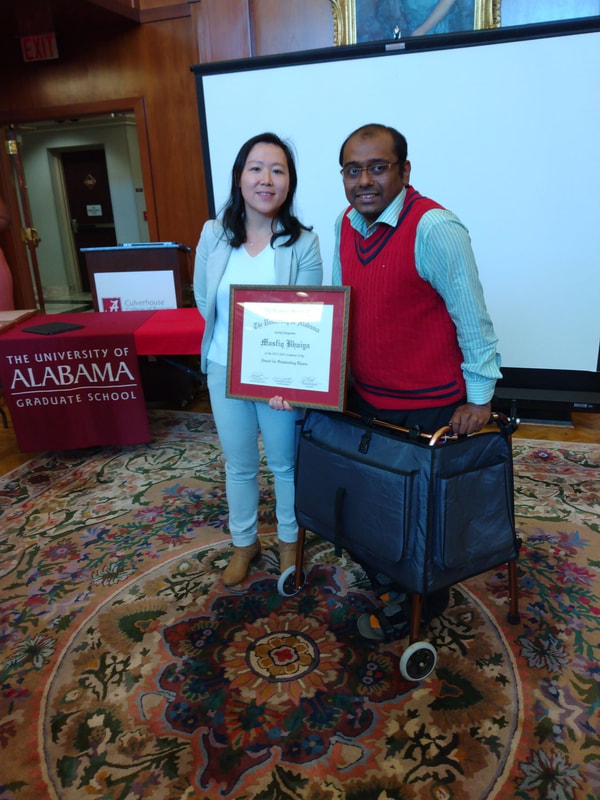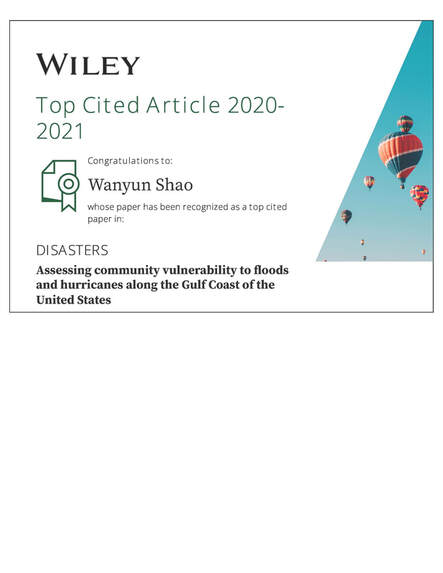|
1/18/2023 0 Comments Our new paper using social media data to detect public response to hurricanes and climate change was published in Climate Risk ManagementOur new paper titled "Toward reduction of detrimental effects of hurricanes using a social media data analytic approach: How climate change is perceived?" has been published in Climate Risk Management. Below please find the abstract:
"During natural disasters, there is a noticeably increased use of social media sites such as Twitter. Substantial research on social media data use during disasters has been conducted in the past decade since various social media platforms have emerged and gained popularity. This research highlights a thorough examination of the textual content of users’ posts shared on Twitter across the 48 contiguous U.S. states (CONUS) during hurricanes Harvey (2017) and Dorian (2019). We processed and analyzed 35 million tweets by classifying them into the main topics of concern discussed on Twitter over the CONUS. Sentiment analysis, topic modeling, and topic classification are a few of the Artificial Intelligence techniques from Natural Language Processing (NLP) that we employed in this work to analyze the Twitter data. Applying the NLP techniques on this large volume of data, made it possible to classify the tweet content into distinct categories in order to reveal valuable information on social response to hurricanes and assist crisis management agencies and disaster responders during and post disasters. Furthermore, this study offers helpful insights on the way climate change is discussed on Twitter before, during and after hurricane Harvey and Dorian. The outcome of this study uncovers detailed information on social response to hurricanes which benefits disaster managers and responders in reducing the detrimental effects of such extreme events and enhancing community readiness when these events occur."
0 Comments
8/31/2022 2 Comments Our new paper on the socio-geographic patterns of rescue requests during Hurricane Harvey has been published in Findings Our paper on the socio-geographic patterns of rescue requests during Hurricane Harvey has been published in Findings. Below is the abstract:
"We analyze a public dataset of rescue requests for the Houston Metropolitan Area during Hurricane Harvey (2017) from the Red Cross. This dataset contains information including the location, gender, and emergency description in each requester’s report. We reveal the spatial distribution of the rescue requests and its relationship with indicators of the social, physical, and built environment. We show that the rescue request rates are significantly higher in regions with higher percentages of children, male population, population in poverty, or people with limited English, in addition to regions with higher inundation rate or worse traffic condition during Hurricane Harvey. The rescue request rate is found to be statistically uncorrelated with the percentage of flood hazard zone designated by the Federal Emergency Management Agency (FEMA)." 8/2/2022 0 Comments Open PhD Position – coastal community resilience, risk perceptions, community engagement, Nature Based Solution The Environmental Decision Making Lab at the Department of Geography of the University of Alabama seeks a geography PhD student to focus on coastal community resilience, risk perceptions, community engagement under the theme of Nature Based Solution (NBS). The broader research team is focused on developing actionable design guidance for NBS (i.e., wetland restoration) along the US Gulf Coast. Our highly interdisciplinary group includes social scientists, wetland ecologists, water resource engineers, and government agency partners. Our goal is to develop guidance for wetland restoration activities optimized to reduce flooding and increase coastal community resilience. To accomplish this goal, we will employ a combination of community engagement, wetland plant community characterization, and state-of-the-art hydrologic and hydraulic modeling.
The successful candidate will be expected to start in spring, 2023. The candidate will work closely with social scientists, wetland ecologists, and water resource engineers, and our government partners to develop, assess, and communicate NBS design alternatives by engaging stakeholders in a knowledge co-production fashion. The candidate will be expected to work with the team to develop a plan for stakeholder engagement meetings, organize and facilitate stakeholder engagement activities, collect the data from the meetings, analyze the data, and report findings in peer-reviewed manuscripts. Through this work, the candidate will also be expected to develop hypothesis driven research based on their interests. The ideal candidate will have MS degrees in a relevant field (i.e., geography, urban and regional planning, environmental sociology, ecology, environmental science, or closely related field). The candidate should be excited about working on an interdisciplinary team; interacting with community partners, and conducting both basic and applied research. Further, experience with statistical analysis and programs (e.g., R, Stata, SPSS) and geographic information systems (e.g., ArcGIS, QGIS) are required. Experience with textual analysis programs (e.g., NVivo) is preferred but not required. Additionally, experience with scripting languages (e.g., R, Python, or Matlab) are preferred but not required. For more information, please contact Dr. Wanyun Shao ([email protected]) Congratulations to Musfiq Bhuiya on winning the University of Alabama Outstanding Thesis Award! Through strong determination and hard work, Musfiq completed a thesis on an exceedingly important topic: accessibility for people with disabilities to critical facilities during a disaster.
We have so far published one paper developed out of his thesis in the International Journal of Disaster Risk Reduction. 3/31/2022 0 Comments Our new paper has been published in the International Journal of Disaster Risk Reduction Our paper has been published in the International Journal of Disaster Risk Reduction (Impact factor: 4.32). Below please find the abstract:
"Climate change has posed serious risks to coastal cities around the world. Effective urban disaster management calls for the coordination between the local government and residents. We propose a comprehensive framework to study urban disaster resilience under climate change with New Orleans of Louisiana in the U.S. as the study area. Municipal hazard mitigation must be sufficient to mitigate these hazards. Residents’ risk perceptions are a vital component of social vulnerability and can shape public decisions to increase disaster resiliency. Because climate change is expected to intensify, it becomes important to ensure that residents’ risk perceptions are considered when developing municipal plans to maximize regional resiliency. This research aims to identify a gap in the hazard mitigation process that can be closed to better prepare the community to manage coastal hazards. To achieve this, an online survey is distributed in the New Orleans metropolitan area to determine residents’ risk perceptions and expectations of the local government’s action. Policy analysis is conducted to identify the priorities held by municipal planners in these issues. Although there is no gap in the perception of risk and municipal mitigation of current coastal hazards, there is a gap between the municipal approach to climate change mitigation and the concern and expectation of actions the residents hold regarding the future effects of climate change. The approach to climate change should be reconsidered on a municipal level and new small-scale personal incentives should be promoted to maximize resiliency toward coastal hazards in the future." Our paper on community vulnerability to floods and hurricanes in the Gulf Coast has been recognized as the most cited paper in the journal Disasters.
Our new paper, entitled "Public awareness and perceptions of drought: A case study of two cities of Alabama" is published in Risk, Hazards, & Crisis in Public Policy. Below please find the abstract:
"Drought poses serious risks to society. There is, however, a lack of timely public awareness and sufficient public risk perceptions of this hazard due to its gradual onset. Timely and adequate public response is conducive to effective mitigation. It is imperative to understand how the public responds to drought. Using data from multiple sources, situated in two cities (Mobile and Huntsville) of Alabama, our study represents a comprehensive effort to understand public awareness and perceptions of drought. We have made several important findings. First, both physical and social contexts can influence public awareness of drought. Mobile is prone to a variety of coastal hazards and displays high social vulnerability. Residents in this city are thus more sensitive to environmental shocks, especially less frequent ones such as drought. Second, public awareness of drought is not constrained within the immediate drought impact area. Governmental declaration or regulation can bring the issue of drought from one area to the attention of the other area within one state. Third, public perceptions of drought numbers are negatively correlated with perceptions of precipitation but positively associated with perceptions of extreme heat. This finding reflects that the public perception of drought is in line with scientific understanding of drought. Drought is by definition persistent deficit of precipitation. Flash droughts can be triggered by heat waves which are more likely to occur during a drought. We end this study with recommendations for future studies." Our new paper, entitled "Understanding the Influence of Political Orientation, Social Network, and Economic Recovery on COVID-19 Vaccine Uptake among Americans" has been published online in Vaccine (Impact factor: 3.641). Below please find the abstract:
"The COVID-19 pandemic poses unprecedented risks to the well-being of Americans. To control the pandemic, a sufficient proportion of the population needs to be vaccinated promptly. Despite the proven efficacy and widespread availability, vaccine distribution and administration rates remain low. Thus, it is important to understand the public behavior of COVID-19 vaccination. This study aims to identify determinants at multiple levels that promote or inhibit one’s vaccine uptake. We combine individual-level data from a national survey conducted in the summer of 2021 with corresponding state-level indicators. Findings of multilevel logistic regression show that political orientation, social network, and economic recovery altogether have significant influence. We articulate that individual decisions to take the vaccine are a function of their personal characteristics and are also rooted in their home state’s political, public health, and economic contexts. These findings contribute to the literature and have policy implications. Knowledge of the profiles among people who take/refuse the vaccine provides essential information to leverage certain factors and maximize vaccine uptake to mitigate the pandemic’s devastating impact." Our paper on pro-environmental behaviors in Copenhagen, Denmark has been published in Cities (Impact factor: 5.834). Below please find the abstract:
"What makes one green in a green capital? Previous research on actions to combat climate change using large national samples identifies how socio-demographic attributes and attitudes and belief profiles condition an individual’s propensity to take actions to improve the environment. Our approach investigates a smaller and more specific context – Copenhagen, Denmark – as a way to unlock particular pathways that animate individuals to combat climate change in a city considered to be one of the world’s greenest. Using a survey of approximately 1,000 Copenhageners, we compare socio-demographic characteristics with attitudinal and belief profiles to see how each explanation predicts four pro-environmental behaviors. We find that attitudes and beliefs, especially with environmental concern and political ideology, tend to be more associated with pro-environmental behaviors compared to socio-demographic characteristics. We conclude by discussing how even in the context of a green capital, familiar pathways to pro-environmental actions are found." Our new paper is published online in Sustainable Cities and Society (impact factor: 7.587). Below please find the abstract:
"The use of social media platforms such as Twitter significantly increases during natural hazards. With the emergence of several social media platforms over the past decade, many studies have investigated the applications of these platforms during calamities. This study presents a comprehensive spatiotemporal analysis of textual content from millions of tweets shared on Twitter during Hurricane Harvey (2017) across several affected counties in southeast Texas. We propose a new Hazard Risk Awareness (HRA) Index, which considers multiple factors, including the number of tweets, population, internet use rate, and natural hazard characteristics per geographic location. We then map the HRA Index across southeast Texas. Utilizing a dataset of 18 million tweets, we employ Natural Language Processing (NLP) along with a set of statistical techniques to perform analysis on the textual data generated by Twitter users during Hurricane Harvey. This enables us to subdivide the tweet contents into several categories per county that would inform crisis management during the event. In all, our study provides valuable information at the county level before, during, and after Harvey that could significantly help disaster managers and responders to minimize the consequences of the event and improve the preparedness of the residents for it. Since HRA is derived based on the meteorological observations and some demographic information, depending on the availability of such dataset and the nature of the hazard (i.e., flood, wildfire, hurricane, and earthquake), this index can be calculated and employed for assessing the risk awareness of a community exposed to either of these natural hazards." |
|




 RSS Feed
RSS Feed